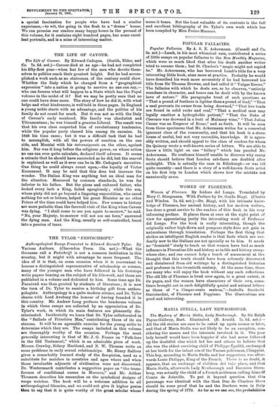THE LIFE OF CAVOUR.
The Life of Cavour. By Edward Cadogan. (Smith, Elder, and Co. 7s. 6d. net.)—Cavour died at an age—he had not completed his fifty-first year—when but few of the men who devote them- selves to politics reach their greatest height. But he had accom- plished a work such as no statesman of the century could show. Whether the Italy which he changed from a "geographical expression" into a nation is going to survive no one can say,— who can foresee what will happen to a State which has the Papal volcano in the midst of it? But we may be pretty sure that no one could have done more. The story of how he did it, with what helps and what hindrances, is well told in these pages. In England a young noble starts with an advantage, and the politics of his family do not count for much. But it was not so with the Italy of Cavour's early manhood. His family was absolutist and Ultramontane; he was himself a genuine Liberal. The result was that his own class suspected him of revolutionary tendencies, while the popular party classed him among its enemies. In 1848 his time came ; but it was a difficult task that he had to accomplish, with all the powers of reaction on the one side, and Mazzini with his intransigeants on the other, against him. Nor was it long before the religious power, on whose action no one can ever quite calculate, declared itself adverse. It seems a miracle that he should have succeeded as he did, but the marvel is explained as well as it ever can be in Mr. Cadogan's narrative. One thing he could always count upon,—the loyalty of Victor Emmanuel. It may be said that this does but increase the wonder. The Italian King was anything but an ideal man for the situation. Measured by common standards, he was far inferior to his father. But the pious and cultured father, who looked every inch a King, failed egregiously ; while the son, whose piety did not go beyond a lingering superstition, who cared nothing for art or letters, helped his great Minister as no other Prince of the time could have helped him. Few scenes in history are more pathetic than the farewell visit of the King when Cavour was dying. "1 shall come to see you again to-morrow," he said. "No, your Majesty, to-morrow will not see me here," answered the dying man. And the King, usually so self-controlled, burst into a passion of tears.




















































 Previous page
Previous page